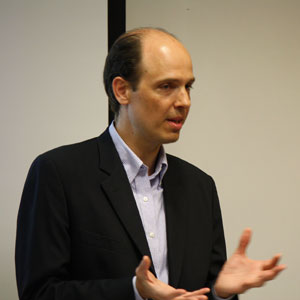Information
Venue
Start
End
11 April 2012 | CIL Seminar
Waiting for Disaster
… and other irresponsible strategies to achieve progress in nuclear disarmament and non-proliferation.
Introduction

When US President Obama committed to working towards a world without nuclear weapons in Prague in 2009, the international arms control community found renewed energy, hoping to have witnessed the dawn of an era of disarmament and non-proliferation. Even though the President did not expect his goal to become reality during his lifetime, the fact that a nuclear weapons state was publicly advocating the abolition of these weapons was a paradigm shift. There was hope that other nuclear weapons states would follow suit and that meaningful progress on nuclear disarmament would result in tangible results in non-proliferation. Suddenly, long sought projects like the entry into force of a nuclear-test ban, a fissile material cut-off treaty, solutions to the nuclear programs of Iran and North Korea, and even a deal on a ‘weapons of mass destruction-free zone’ in the Middle East appeared within reach – or, at least, within view.
Three years on, this view has become seriously clouded. The goals remain but the international community is still at odds on how to reach them. The few positive developments – the New START Treaty, the NPT-Review Conference 2010 and the Nuclear Safety Initiative – cannot hide the lack of real progress and the return of general malaise and frustration in nuclear arms control. Over the last half year, the discrepancy between the clear recognition of the severity of the nuclear threat on the one side and the hapless, helpless efforts by the international community on the other has increased sharply. Experts are beginning to question the multilateral security system itself: Are we witnessing a failure of the system? Or is the system working just as it should – and the result an honest reflection of the reigning political will? Whatever the reasons, one thing is clear: it will require thought-through plans, substantial efforts and real political leadership to help prevent a global nuclear catastrophe.
About the Speaker
Ambassador Alexander Marschik is the Austrian Permanent Representative at the European Union’s Political and Security Committee.
Prior to this appointment, he had served as the Director for Disarmament, Arms Control and Non-Proliferation at the Austrian Ministry for European and International Affairs (2007-2010). From 1999-2007 he had been posted to the Austrian Mission to the United Nations in New York, the last four years as Deputy Permanent Representative. Earlier in his career he had served as First Secretary at the Austrian Mission to the UN in Geneva as well as in the EU-Division and the International Law Department of the Ministry in Vienna.
Before joining the Ministry, Ambassador Marschik worked in academia: for seven years he was Assistant Professor and Lecturer at the University of Vienna’s Institute for International Law and International Relations.
Among the functional positions he has held are the Vice-Chairman of the Sixth Committee of the 56th UNGA (2001-2002) and the Rapporteur of the Assembly of States Parties of the International Criminal Court (2002-2005). He was the Austrian Head of Delegation at many Arms Control Conferences and served as Chair of the Disarmament Negotiations at the NPT-Review Conference 2010.
He has published several articles on international law and international relations (as ‘Axel’ Marschik).


